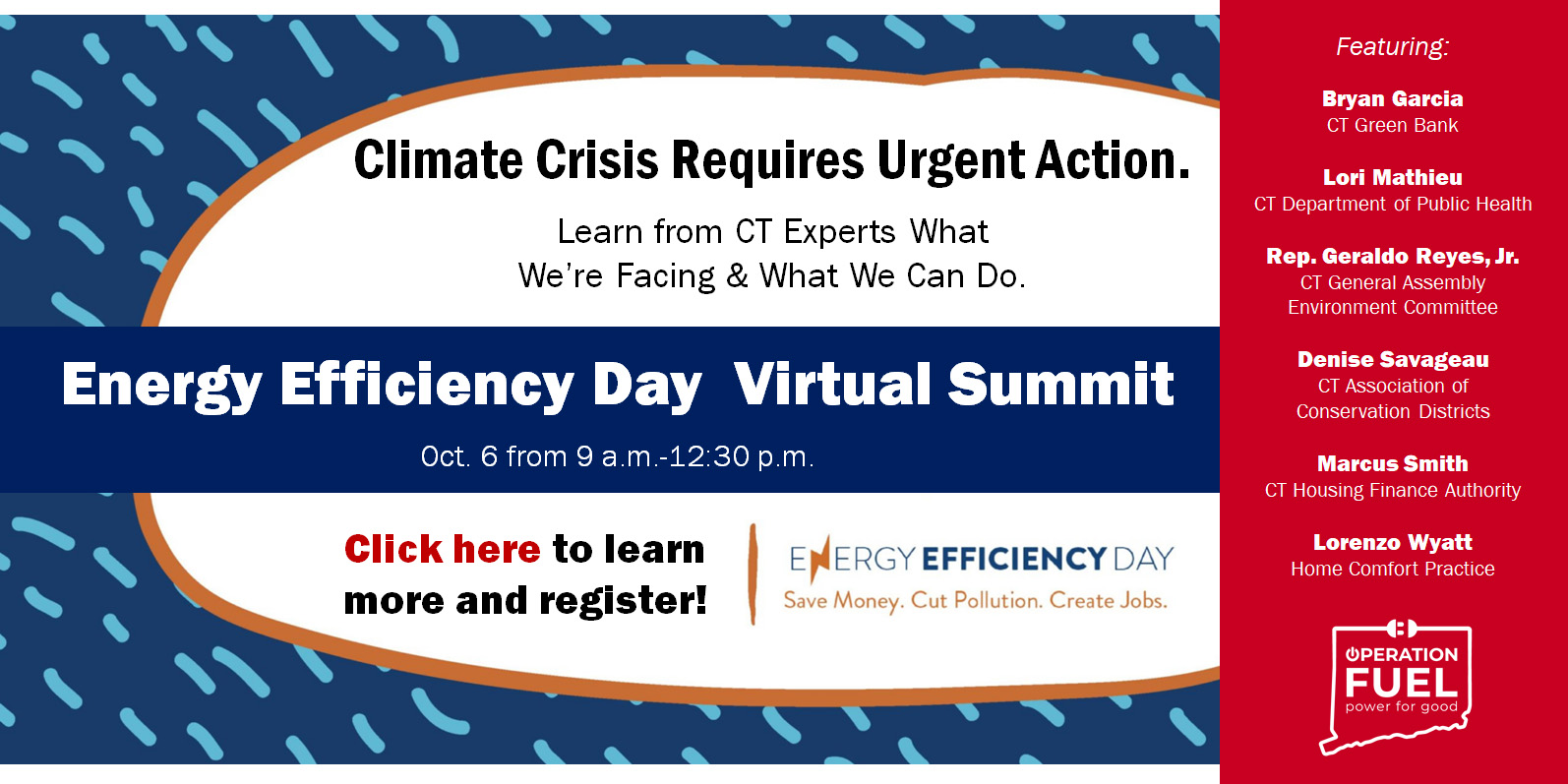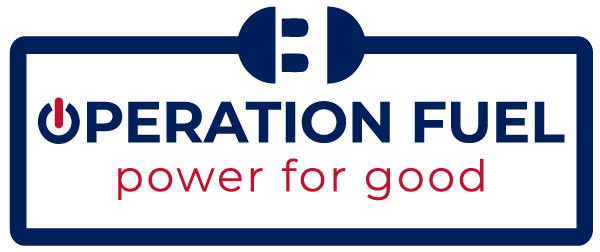With Climate Crisis Looming, Operation Fuel Hosts Energy Efficiency Day Virtual Summit October 6, 2021 Featuring CT Energy, Water Experts
 The climate crisis requires immediate action – we all need a better understanding of the environmental, economic, and health issues that we are facing and what steps we can take to help mitigate them.
The climate crisis requires immediate action – we all need a better understanding of the environmental, economic, and health issues that we are facing and what steps we can take to help mitigate them.
That’s why Operation Fuel has gathered experts from Connecticut’s energy and water fields for an important virtual summit on Energy Efficiency Day, October 6, 2021. Operation Fuel is part of a collaborative national network promoting energy affordability, equity, and efficiency – the cheapest, quickest way to meet our energy needs, cut utility bills, and reduce pollution.
Please join us for this half-day online summit Wednesday, October 6, from 9 a.m.-12:30 p.m. that focuses on what is being done in our state and actions you can take.
Click here to register.
Wednesday, October 6, 2021, 9 a.m.-noon
- 9-9:07 a.m. – Welcome and opening message by Operation Fuel’s Executive Director Brenda Watson
- 9:08 a.m. – Message from CT Lt. Gov. Susan Bysiewicz
- 9:15 a.m. – Energy panel moderated by Operation Fuel’s Gannon Long, featuring:
- Marcus Smith, CT Housing Finance Authority
- Lorenzo Wyatt, Home Comfort Practice
- CT Rep. Geraldo Reyes
- 10:35 a.m. break
- 10:45 a.m. – Message from DEEP Commissioner Katie Dykes
- 10:50 a.m. – Water panel moderated by Operation Fuel’s Executive Director Brenda Watson, featuring:
- Denise Savageau, CT Association of Conservation Districts
- Lori Mathieu, CT Department of Public Health
- Bryan Garcia, CT Green Bank
- 12:20 p.m. – Closing comments, Brenda
- 12:30 p.m. – End
Our summit will feature two sessions – one on energy and one on water – and these experts:
Session 1: Energy
- Connecticut Rep. Geraldo Reyes, Jr., member of the Connecticut General Assembly’s Environment Committee, which focuses on matters relating to the Department of Energy and Environmental Protection that include conservation, recreation, pollution control, fisheries and game, state parks and forests, water resources and flood and erosion control.
- Marcus Smith, Director of Research, Marketing, and Outreach at Connecticut Housing Finance Authority, which works to provide low-and moderate-income residents in Connecticut a range of choices where they can live in affordable, safe, quality housing located in environmentally sustainable and economically healthy communities.
- Lorenzo Wyatt, Owner, Home Comfort Practice, an Energize Connecticut authorized home improvement contractor that provides energy efficient construction solutions including weatherization, energy audits, insulation, heat pumps, and more.
- Moderator: Operation Fuel Policy and Public Affairs Director Gannon Long.
Session 2: Water
- Lori Mathieu, Public Health Drinking Water Section Chief, Connecticut Department of Public Health, which is responsible for the administration of state and federal drinking water regulations and is dedicated to assuring the quality and adequacy of the state’s public drinking water sources.
- Denise Savageau, President, Connecticut Association of Conservation Districts, a network of local non-profits that promote conservation and sound use of local resources including preservation of fragile water resources, technical support for municipalities and citizens, and education around ethic and environmental stewardship.
- Bryan Garcia, President and CEO of Connecticut Green Bank, the nation’s first green bank that works to confront climate change and provide all of society a healthier and more prosperous future by increasing and accelerating the flow of private capital into markets that energize the green economy.
- Moderator: Operation Fuel Executive Director Brenda Watson.
Energy Efficiency Facts
COST SAVINGS:
- Smarter energy use means we don’t have to generate as much power to meet our needs. Reducing the energy used by manufacturers, homes, and businesses benefits everyone – especially energy bill-payers. The average household saves almost $500 yearly thanks to efficiency standards that apply to new appliances such as dishwashers, refrigerators and water heaters, alone.
- Since 1990, savings from energy efficiency gains have averted the need to build 313 large power plants and has delivered cumulative savings of nearly $790 billion for Americans. Efficiency could provide one-third of total expected electricity generation needs by 2030, avoiding the need for an additional 487 large power plants.
HEALTH BENEFITS:
- Reducing annual electricity use by 15% nationwide would save more than six lives every day, prevent nearly 30,000 asthma episodes each year, and save Americans up to $20 billion through avoided health harms annually.
EQUITY:
- Rural households, especially low-income, nonwhite, and elderly, spend an average of 40% more of their incomes on energy than their metropolitan counterparts. Energy efficiency upgrades could lessen these energy burdens and save households more than $400 a year.
JOB CREATION:
- We know that energy efficiency is also an economic engine, amassing a U.S. workforce of nearly 2.4 million by the beginning of this year. Ranging from professional services to manufacturing, installation, and construction, these good jobs are local and cannot be outsourced.
- Energy efficiency employs 2.25 million people in the US today – more than the number of people who work in the coal, oil, gas, electricity, and even renewable energy industries combined.
- Energy efficiency added more new jobs than any other industry in the entire U.S. energy sector in 2017.
For more information and action steps, please energyefficiencyday.org
